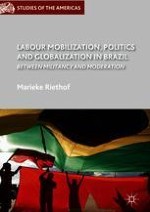2019 | OriginalPaper | Buchkapitel
4. New Unionism: Protest, Mobilization, and Negotiating the Transition to Democracy, 1978–1988
verfasst von : Marieke Riethof
Erschienen in: Labour Mobilization, Politics and Globalization in Brazil
Aktivieren Sie unsere intelligente Suche, um passende Fachinhalte oder Patente zu finden.
Wählen Sie Textabschnitte aus um mit Künstlicher Intelligenz passenden Patente zu finden. powered by
Markieren Sie Textabschnitte, um KI-gestützt weitere passende Inhalte zu finden. powered by
